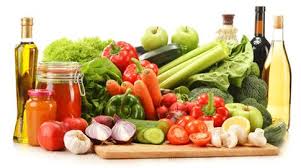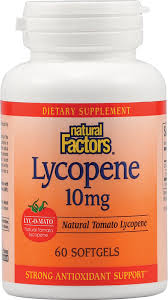Tomato Extract (Lycopene) Relieves Damaged Arteries
 Cardiovascular medications, especially those for hypertension, constitute approximately 25 percent of all prescribed medications in the world. By decreasing vascular resistance and blood flow these drugs have many side effects including blood disorders, impotence, inflammation of the liver, elevated blood glucose, increased heart rate, depression and even cancer. It turns out that the antioxidant lycopene, which is found in tomatoes and in other yellow, red, and orange vegetables, is a valuable alternative that is capable of widening blood vessels by more than 50 percent according to new research in PLOS One.
Cardiovascular medications, especially those for hypertension, constitute approximately 25 percent of all prescribed medications in the world. By decreasing vascular resistance and blood flow these drugs have many side effects including blood disorders, impotence, inflammation of the liver, elevated blood glucose, increased heart rate, depression and even cancer. It turns out that the antioxidant lycopene, which is found in tomatoes and in other yellow, red, and orange vegetables, is a valuable alternative that is capable of widening blood vessels by more than 50 percent according to new research in PLOS One.
According to new research from the University of Cambridge, a daily supplement of an extract found in tomatoes can improve the function of blood vessels in patients with cardiovascular disease, making many health experts now question the use of pharmaceutical drugs when natural alternatives can effectively treat the same cardiovascular conditions without the side effects.
"The problem with vasodilator drugs is that they lead to increased heart rate and oxygen demand which contradicts treatment protocols for coronary artery disease," said practicing cardiologist Dr. Antonio Diaz. "They do work in the short-term, but long-term use leads to retention of sodium and water which increases blood volume and cardiac output at rest, which too is a counterproductive to a patient with CAD," he concluded.
The incidence of cardiovascular disease varies worldwide, but is less where the ‘Mediterranean diet’ is consumed, consisting of a greater consumption of fruits, vegetables and olive oil. Recent studies suggest that this diet reduces the incidence of events related to the disease, includin g heart attack and stroke, in patients at high cardiovascular risk, or those who have previously had the disease.
g heart attack and stroke, in patients at high cardiovascular risk, or those who have previously had the disease.
One component of this Mediterranean diet is lycopene, a powerful antioxidant which is ten times more potent than vitamin E. Lycopene is found in tomatoes and other fruits, and its potency appears to be enhanced when it is consumed pureed, in ketchup or in the presence of olive oil.
Recent evidence has shown that just two ounces of tomato paste or a pint of juice a day could be enough to help many patients avoid dangerous statins the class of drugs commonly prescribed for these conditions which can lead to heart problems.
Researchers in Israel found that a daily dose of tomato extract helped lower blood pressure among 31 men and women with mild hypertension. On average, their systolic pressure --the top number in a blood-pressure reading --dropped 10 points, while their diastolic pressure, or bottom number, dipped four points, both statistically significant differences.
Tomatoes and tomato-based products are by far the most important dietary sources of lycopene in observational studies, and most human lycopene trials are performed using tomato-based interventions. Cooked tomatoes are best as tests showed the body can absorb more lycopene from these than raw fruit.
Lycopene Improved Widening of Blood Vessels By Over a Half
In a study published in the journal PLOS One, researchers at the University of Cambridge and the Cambridge University Hospitals National Health Service Foundation Trust demonstrate one mechanism by which they believe lycopene reduces the risk.
Dr Joseph Cheriyan, consultant clinical pharmacologist & physician says: “There’s a wealth of research that suggests that the Mediterranean diet -- which includes lycopene found in tomatoes and other fruit as a component -- is good for our cardiovascular health. But so far, it’s been a mystery what the underlying mechanisms could be.”
The researchers carried out a randomised, double blind, placebo controlled, interventional trial investigating the effects of lycopene a gold standard method of measuring the function of blood vessels called forearm blood flow, which is predictive of future cardiovascular risk. Thirty-six cardiovascular disease patients and thirty-six healthy volunteers were given either Ateronon (an off-the-shelf supplement containing 7mg of lycopene) or a placebo treatment. As a double blind trial, neither the study participants nor the resear chers dispensing the pills were aware which treatment was being provided.
chers dispensing the pills were aware which treatment was being provided.
The patients with cardiovascular disease were all on statins (cholesterol-lowering drugs). However, despite this, they still had a relatively impaired function of the endothelium -- the inner lining of blood vessels -- compared to healthy volunteers. This function is determined by the response of blood vessels in the forearm to a naturally occurring molecule called acetylcholine. Endothelial function predicts future events, so having a healthy endothelium is an important factor in preventing the evolution of heart disease.
The researchers found that 7mg of oral lycopene supplementation improved and normalised endothelial function in the patients, but not in healthy volunteers. Lycopene improved the widening of the blood vessels by over a half (53%) compared to baseline in those taking the pill after correction for those who took the placebo; constriction of the blood vessels is one of the key factors that can lead to heart attack and stroke.
“We’ve shown quite clearly that lycopene improves the function of blood vessels in cardiovascular disease patients,” adds Dr Cheriyan. “It reinforces the need for a healthy diet in people at risk from heart disease and stroke."
